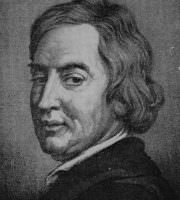About John Dryden
John Dryden, born August 19, 1631 in Aldwincle, Northamptonshire, and died May 12, 1700 (aged 68), was an English poet and playwright who exerted a strong influence in the 17th century. His first plays, often heroic tragedies, met with very variable success. It begins before the public with stanzas in praise of Cromwell (1658). Two years later, he celebrates the return of Charles II from England, in a poem entitled Astrea rata. He also composed the poem Annus Mirabilis in honor of this prince in 1667. As a reward, he was named Poet Laureate in 1668. His plays and poetry served to make a name for him and to publicize his royalist feelings.He then devotes himself to the theater, writes comedies and tragedies, and obtains for thirty years an uninterrupted series of successes including The Rival Ladies and Don Sebastian. Dryden also practiced in the satirical genre, publishing political and literary satires in verse, among others Absalon and Achitophel in 1681 and MacFlecknoe in 1682 (against the poet Thomas Shadwell), which attracted him many enemies and even expose him to mistreatment.
He became a Catholic under Jacques II, shortly before the revolution of 1688: so he lost, under William of Orange, his title of Poet Laureate and the advantages attached to it. Having no other resource than his talent, he goes back to work, although already old. He then translated a number of works by Virgil between 1697 and 1700. At the same time, he composed several of his best works: his translation of the Aeneid, 1697; his translations of Juvénal and Perse, as well as his Fables, 1698; and the most beautiful of his odes, the Feast of Alexander, for Sainte-Cécile (set to music by Henry Purcell then by Georg Friedrich Handel). Besides his works in verse, he composed some in prose; the most esteemed is The Essay on Dramatic Poetry, in Dialogue.
John Dryden is buried in Poets' Corner, Westminster Abbey.
Browse all poems and texts published on John Dryden









